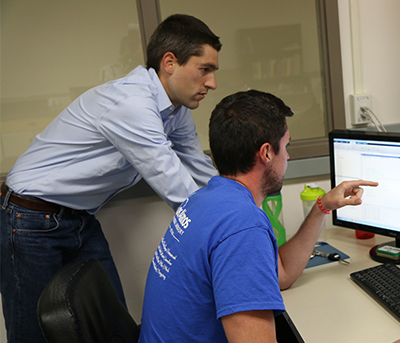Mechanical Engineering Associate Professor Bart Raeymaekers was recently elevated to the grade of fellow of the American Society of Mechanical Engineers (ASME). The ASME fellow grade recognizes “exceptional engineering achievements and contributions to the engineering profession.” The title of fellow has been awarded to only about three percent of over 100,000 ASME members.
Raeymaekers’ research interests span two areas; tribology with an emphasis on micro- and nanoscale lubrication, and materials manufacturing with an emphasis on directed self-assembly. Furthermore, Raeymaekers is passionate about interaction between academia and industry, and has founded a manufacturing center at the University of Utah, funded by the U.S. Department of Commerce, which interacts with small- and medium-sized manufacturing companies in Utah, attempting to bridge the gap between academic research and engineering practice.
Tribology is the science of friction, wear, and lubrication. The research of Prof. Raeymaekers and his students spans multiple length scales and involves both lubricated and dry contact. Of special note is his work on lubrication in prosthetic hip joints. A prosthetic hip joint lasts for approximately 15 years before failing due to a variety of possible reasons, including wear. This limited longevity causes many patients to outlive their prosthetic joint and require a revision surgery. Raeymaekers and his students have designed and manufactured engineered, patient-specific prosthetic hip bearing surfaces that stimulate the formation of a lubricant film and reduce wear of the prosthetic joint. “With this work, we aim to impact patient quality of life, by reducing their chance of needing a risky and costly revision surgery,” Raeymaekers says.
 He has also worked on materials processing research to manufacture engineered materials with tailored properties. The ability to design and manufacture multi-functional materials with tailored properties, including optical, thermal, electrical, acoustic, and/or mechanical properties, is of interest to the scientific community because of the game-changing impact it can have on many engineering applications. Raeymaekers and his students develop scalable material synthesis techniques based on ultrasound directed self-assembly, i.e., using ultrasound waves to make large quantities of particles organize themselves into user-specified patterns within a matrix material.
He has also worked on materials processing research to manufacture engineered materials with tailored properties. The ability to design and manufacture multi-functional materials with tailored properties, including optical, thermal, electrical, acoustic, and/or mechanical properties, is of interest to the scientific community because of the game-changing impact it can have on many engineering applications. Raeymaekers and his students develop scalable material synthesis techniques based on ultrasound directed self-assembly, i.e., using ultrasound waves to make large quantities of particles organize themselves into user-specified patterns within a matrix material.
Raeymaekers received his B.S. (2002) and M.S. degree (2004) in mechanical engineering in his native Belgium, and moved to the U.S. in 2004, where he completed another M.S. (2005) and a Ph.D. (2007) degree at the University of California San Diego, also in mechanical engineering. After finishing his Ph.D. he obtained a full-time MBA (2009) at the Massachusetts Institute of Technology, and was hired as the first “entrepreneurial post-doc fellow” at the Los Alamos National Laboratory in 2009. He joined the University of Utah since 2010 and says, “The Department of Mechanical Engineering at the University of Utah is a great place to do research, and I have been lucky to work with very talented, hard-working students in my group, which makes it exciting and rewarding.”
To learn more about Raeymaekers and his current research projects please visit the Utah Tribology and Precision Engineering Lab website.